In this article, we’ll provide a comprehensive guide to RV weight restrictions and how to stay within them. We’ll also answer some common questions about RV weight and what factors can affect it. So whether you’re just starting to plan your next road trip or are curious about your current RV’s specs, read on for everything you need to know about How Much Does an RV Weigh!
Table of Contents
How much does an RV weigh?
This is a question that we get asked a lot, and it’s understandable why. After all, RVs are big vehicles and they can weigh a lot. So how much does an RV weigh?
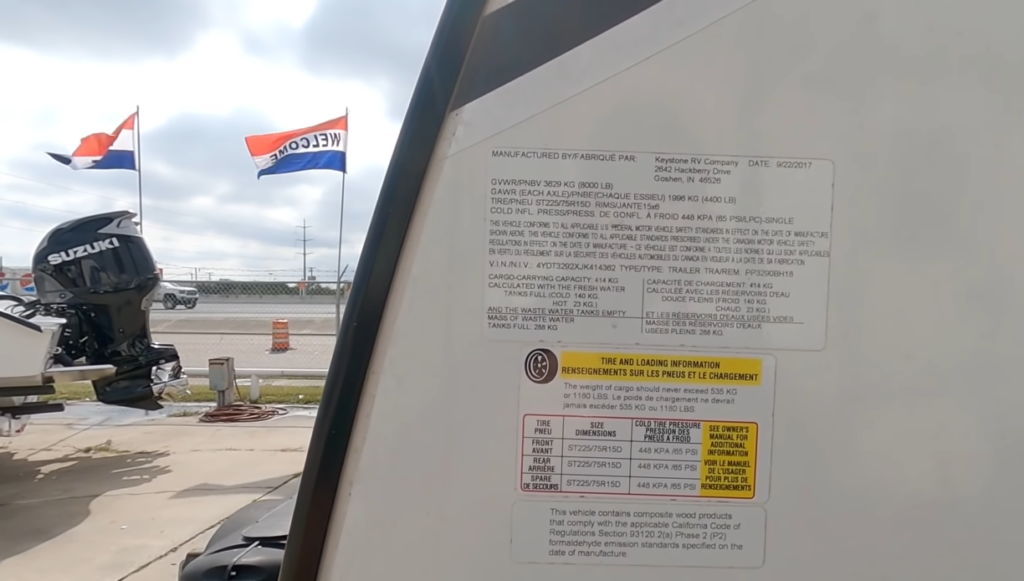
The answer to this question depends on the type of RV you have. For example, a pop-up camper will weigh less than a fifth wheel or travel trailer. And the weight of an RV also varies depending on the size and amenities that it has.
Here’s a general breakdown of how much different types of RVs weigh:
- Pop-up campers typically weigh between 1500 and 3000 pounds (680 to 1360 kg).
- Travel trailers usually weigh between 4000 and 9000 pounds (1800 to 4090 kg).
- Fifth wheels typically weigh between 7000 and 14000 pounds (3150 to 6350 kg).
Of course, these are just averages and your RV could weigh more or less than these ranges. The best way to know for sure how much your RV weighs is to check the weight rating that is listed on the RV itself. [1]
Now that you know how much RVs weigh, you might be wondering why this information is important. Well, there are a few reasons. First of all, if you’re going to be towing your RV behind a vehicle, you need to make sure that your vehicle can safely handle the weight of the RV. Secondly, knowing the weight of your RV can help you determine how much stuff you can pack inside.
Water and Gear Weight
In addition to the weight of the RV itself, take into account the weight of your water and gear. A full tank of water can add several hundred pounds to the weight of your RV, so it’s important to factor that in when packing. And if you’re bringing along a lot of gear, that will add even more weight.
So how much does an RV weigh? It depends on the type and size of RV, as well as how much water and gear you’re carrying. Be sure to check the weight rating on your RV to make sure it can safely handle the total weight of your trip.
With a little planning, you can be sure that your RV is within its safe operating limits. So get out there and enjoy the open road!
Slides and the Weight of Your Camper
If you have a slide in your RV, then the weight of your camper is going to be different when the slide is in and when it’s out. Most RVs will have a weight rating for both scenarios. So if you’re planning on using the slide, be sure to check the weight rating for that specific configuration.
The same goes for any other type of RV that has moving parts. If there are parts of your RV that can be extended or retracted, then the weight of your RV will be different in those different positions. So again, just be sure to check the weight rating for each configuration that you might use.

How Construction Type Affects Weight
The construction of your RV will also affect the weight. For example, RVs that are made with aluminum frames are going to be lighter than those that are made with steel frames. And if you have an RV with slide-outs, it’s going to weigh more than one without slide-outs.
So if you’re wondering how much your RV weighs, the answer is that it depends on a lot of factors. But as long as you know the weight rating for your specific RV and stay within those limits, you’ll be able to enjoy your time on the open road.
Understanding the Listed Numbers
The weight of your RV is going to be listed in a few different places. The first place you’ll find it is on the RV itself. There should be a sticker somewhere on the RV that lists the dry weight and the GVWR.
GVWR stands for gross vehicle weight rating. This is the total amount of weight that your RV can safely handle, including everything inside, such as water, gear, and passengers.
It’s important to note that the GVWR is different than the dry weight. The dry weight is just the RV itself, without any water or gear inside. The GVWR includes the dry weight of the RV plus the weight of everything else that you might put inside, such as water, gear, and passengers.
You’ll also find the dry weight and GVWR listed in your RV’s owner’s manual. And if you’re buying a used RV, you can usually find this information online from the previous owner.
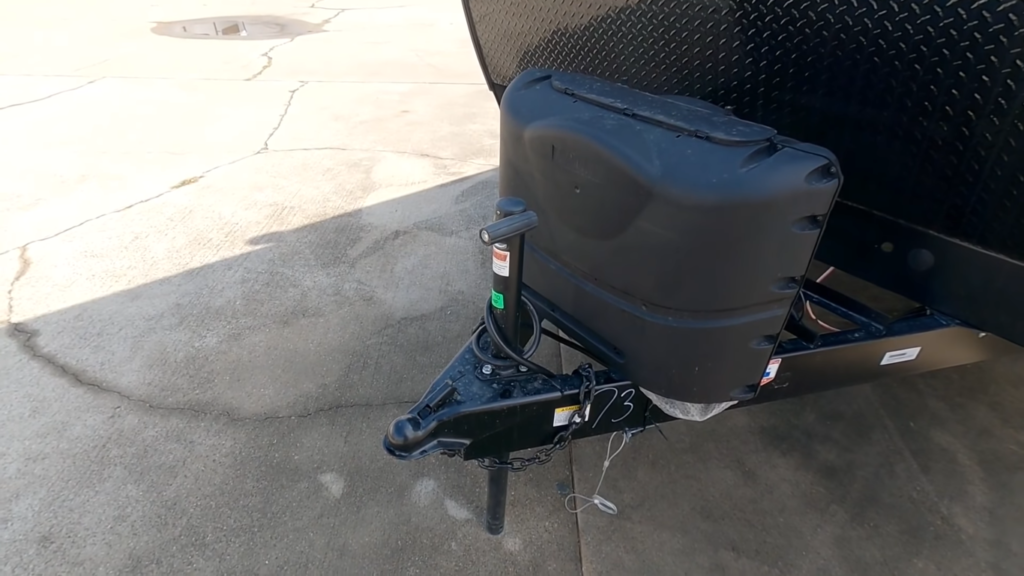
Unloaded vehicle weight
(UVW)
The UVW is the base weight of an RV and includes all standard equipment, fluids, a full tank of gas, and the curbside weight of any options installed on that particular unit.
The UVW does not include cargo, fresh water, propane, or passengers. In order to get the true unloaded weight of your travel trailer you will need to weigh it with all gear and fluids on board but no passengers.
The UVW is shown on a sticker placed inside your RV near the main entrance. [2]
If you can’t find the sticker, the UVW should also be listed in your RV’s owner’s manual.
Gross vehicle weight
(GVWR)
You can think of it as the absolute limit of how much your RV can weigh and still be safe to drive.
Just remember that the GVWR includes the weight of everything—so if you weigh your RV with a full tank of gas and a few people onboard, you’re likely to be over the GVWR.
You can make sure you stay under the GVWR even when fully loaded.
If you’re planning on packing your RV to the brim with gear and passengers, it’s important to know how much it can weigh while still being safe to drive. Here’s a guide to help you understand an RV’s listed weights and what they mean.
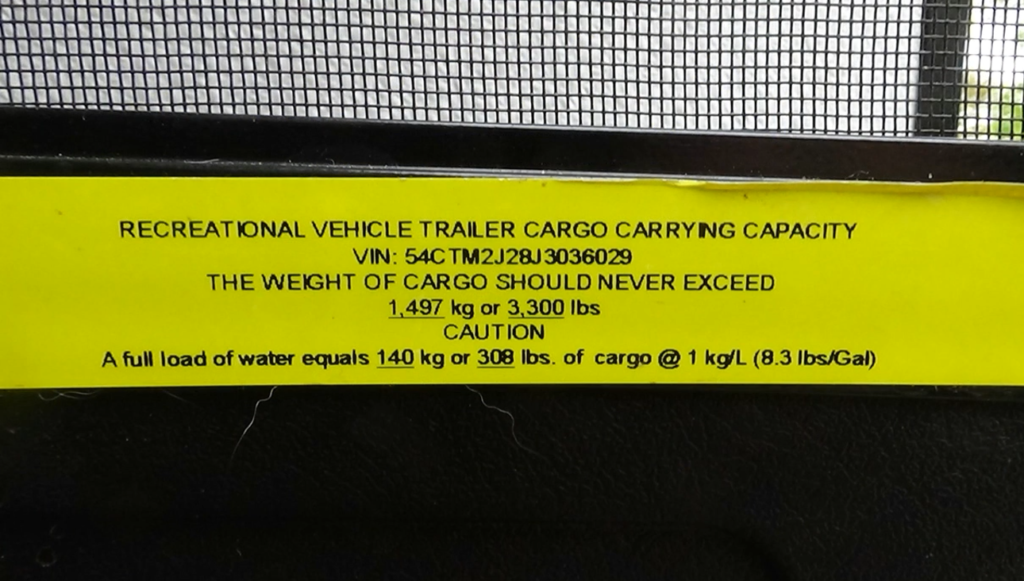
RVs are generally built with either aluminum or fiberglass construction. Aluminum RVs are typically lighter than fiberglass RVs, but they also have a lower weight capacity. So if you’re looking for an RV that can handle a lot of weight, you’ll want to choose one with a fiberglass construction.
Most RVs also have a GVWR, which stands for gross vehicle weight rating. This is the total amount of weight that your RV can safely handle, including the dry weight, water, gear, and passengers.
Dry hitch weight
The dry hitch weight is the weight of your RV when it’s not hooked up to a vehicle. This is important to know because you’ll need to make sure your vehicle can handle the dry hitch weight of your RV before you hit the road.
If you’re buying a used RV, the previous owner may be able to provide you with this information.
Keep in mind that the dry hitch weight doesn’t include any water or gear that you might add later. So if your RV has a dry hitch weight of 1000 pounds (453 kg), that means it weighs 1000 pounds (453 kg) when it’s not hooked up to a vehicle and it’s empty. [3]
Cargo carrying capacity
The cargo carrying capacity (CCC) is the amount of weight your RV can safely carry in addition to the dry hitch weight.
The CCC is listed on a sticker inside your RV near the main door. It’s also listed in your RV’s owner’s manual.
Don’t Max Out Your Towing Vehicle
Your towing vehicle’s job is to get your RV from Point A to Point B. It’s not designed to be a moving van and haul around a bunch of extra weight.
There are a few different ways to weigh your RV. The most accurate way is to take it to a truck stop or public scale that can weigh large vehicles. This will give you the total RV weight, including all of your gear, fluids, and anything else you have on board.
If you don’t have access to a public scale, you can also weigh your RV at home using a bathroom scale. First, weigh yourself and then weigh yourself again while holding the tongue of your RV hitch. The difference between the two weights is the weight of your RV tongue.
Once you know the weight, you can start looking at tow vehicles. It’s important to choose a vehicle that can comfortably and safely tow your RV. Remember to factor in the weight of your gear, fluids, and any other items you’ll be bringing along for the ride when choosing a tow vehicle.
What Class Does My RV Fall Into?

There are three main classes of RVs: Class A, B, and C.
- Class A RVs are the largest and most luxurious. They can range from 24 to 45 feet long and weigh up to 26,000 pounds.
- Class B RVs are smaller and more compact than Class As. They’re often called “camper vans” and usually only sleep two people. They can range from 16 to 22 feet long and weigh up to 12,500 pounds.
- Class C RVs are mid-sized RVs that fall somewhere between Class As and Class Bs in terms of size and weight. They can range from 20 to 32 feet long and weigh up to 16,000 lbs.
Travel trailers, pop up campers and 5th wheels also fall into different classes based on their size and weight. To figure out what class your RV falls into, you’ll need to know its length and dry weight (how much it weighs without any passengers or gear). You can usually find this information in the RV’s owner’s manual or on its website.
- Travel Trailer: 5000-9500 pounds
- Pop Up Camper: 1500-4500 pounds
- Fifth Wheel: 7000-12000 pounds
As you can see, there’s a pretty big range in weights for each class of RV. The best way to get an accurate estimate of your RV’s weight is to take it to a truck stop or weigh station and have it weighed. [4]
How to Manage Your RV Weight
Now you need to learn how to manage that weight. Here are some tips:
- Get a weigh station scale: Weigh stations are usually located near highways and they can weigh your RV for free. This is a great way to get an accurate measurement of your RV’s weight.
- Use a trailer axle scale: Another great way to get an accurate measurement of your RV’s weight is by using a trailer axle scale. These scales are designed specifically for RVs and can be found at many campgrounds and RV dealerships.
- Get your RV weighed professionally: If you want the most accurate measurement of your RV’s weight, you can always take it to a professional weighing company. They will charge you a fee, but it will be worth it for the peace of mind.
How Does Weight Affect How Much My Vehicle Can Tow?
The amount of weight your vehicle can tow is determined by its towing capacity. Your towing capacity is determined by your vehicle’s engine, transmission, axle ratio, and brakes.
The capacity of your truck is usually listed in your owner’s manual or on a sticker inside the driver’s door.
Overloading your vehicle can lead to serious problems like decreased braking performance, difficulty steering, and even engine damage. So it’s important that you always stay within your towing capacity when loading up your RV. [5]
Weight Factors to Consider When Choosing Your RV
There are many factors to consider when choosing an RV, and one of the most important is weight. How much does an RV weigh? It depends on the size and type of RV, as well as what you plan to use it for. The weight of your RV will affect how much fuel it uses, how easy it is to tow, and how well it handles on the road.
Here are a few things to keep in mind when considering the weight of your RV:
- Size: The bigger the RV, the more it will weigh. If you’re planning on doing a lot of off-roading or traveling in rough terrain, you’ll need a heavier RV that can handle the bumps and bruises. On the other hand, if you’re mostly sticking to paved roads, a lighter RV will be just fine.
- Type: The type of RV you choose will also affect its weight. For example, fifth wheels are typically heavier than travel trailers. If you’re not sure which type of RV is right for you, check out our guide to the different types of RVs.
- Construction: The construction of your RV will also play a role in its weight. Heavier materials like steel or aluminum will make your RV weigh more, but they’ll also add to its durability. Lighter materials like fiberglass or wood might save you some pounds, but they won’t be as durable in the long run.
- Usage: Finally, how you plan to use your RV will also affect its weight. If you’re planning on carrying a lot of gear or towing a vehicle behind your RV, you’ll need a heavier RV that can handle the extra weight. On the other hand, if you’re just using your RV for weekend getaways, a lighter RV will be just fine. [6]
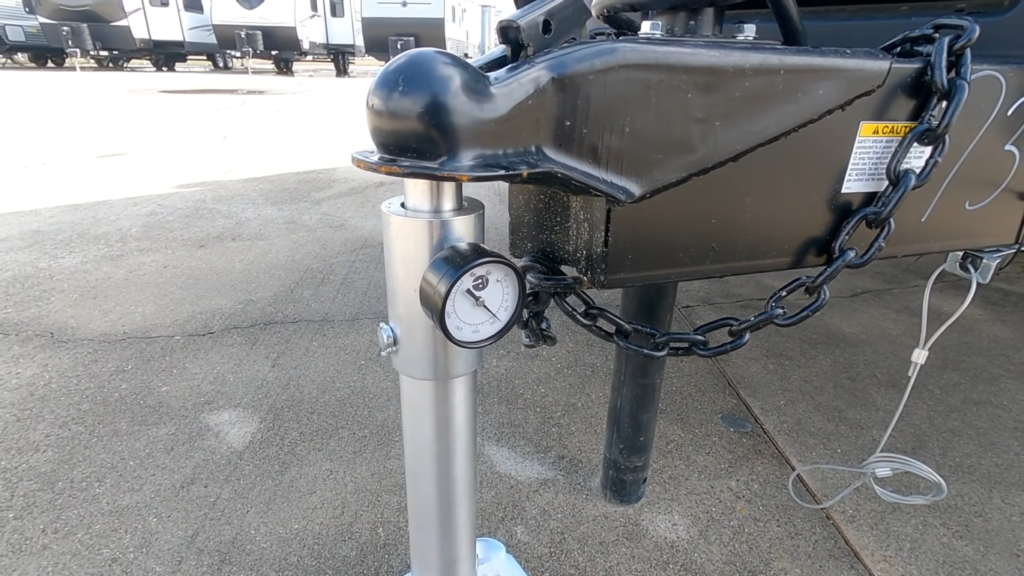
FAQ
What is the average weight of a 40 foot RV?
The average weight of a 40 foot RV is approximately between 12,000 and 30,000 pounds. [7]
What is the average weight of a large RV?
The average weight of a large RV is around 16,000 pounds (7315 kg). However, there are many factors that can affect an RV’s weight, such as its size, features, and amenities. Some RVs can weigh as much as 30,000 pounds (13608 kg), while others may only weigh around 5000 pounds (2268 kg).
It’s important to know how much your RV weighs because this information can be used to help determine things like how much fuel it will consume and what kind of roads it can travel on. It’s also a good idea to know the weight of your RV if you ever need to move it or have it towed.
There are a few different ways to find out how much your RV weighs. One way is to look in the owner’s manual. Most RVs will have the weight listed in the specifications section. Another way to find out an RV’s weight is to use a public weigh station.
Now that we’ve answered the question “How much does an RV weigh?”, let’s take a look at some tips for reducing an RV’s weight.
One way to reduce an RV’s weight is to travel without any unnecessary items. For example, you may not need to bring along a full set of dishes or cookware if you’re only planning on eating out most of the time. You can also save weight by leaving behind items like bicycles, kayaks, and other recreational equipment that you won’t be using during your trip.
Another way to reduce the weight of your RV is to choose lighter-weight materials whenever possible. For instance, opting for aluminum instead of wood for your RV’s construction can save hundreds of pounds. And, if you’re looking for ways to save money on fuel costs, choosing an RV with lightweight components can help improve your gas mileage.
Finally, if you’re really serious about saving weight, you might want to consider downsizing to a smaller RV. Smaller RVs are typically lighter and easier to tow, which can make a big difference when you’re trying to conserve fuel or travel on narrow roads.
How much do most RV trailers weigh?
The average weight of most RV trailers is around 5000 pounds (2268 kg). However, there are smaller trailers that can weigh as little as 1500 pounds (680 kg) and larger ones that can weigh up to 10000 pounds (4536 kg).
There are a few factors that will affect an RV trailer’s weight, such as the size of the trailer and what it’s made out of. For example, a travel trailer that’s made out of aluminum will generally be lighter than one made out of fiberglass.
If you’re wondering how much your specific RV trailer weighs, the best way to find out is by contacting the manufacturer or looking in the owner’s manual.
When it comes to RVs, weight is an important consideration. That’s because the weight of your RV will determine how much it can tow and how well it will perform on the road. [8]
If you’re planning to buy an RV or are already an RV owner, make sure you know the weight of your rig. This way, you can make sure that you’re not overloading it and that you’re using the right size hitch.
Knowing the weight of your RV is also important for safety reasons. If you’re ever in an accident, emergency personnel will need to know the weight of your RV so they can properly assess the situation and provide assistance.
Useful Video: RV Tongue Weight Challenge! How much weight do Travel Trailers actually transfer? part 1
Conclusion
We hope you found this guide helpful! As you can see, there is no one-size-fits-all answer to the question of how much an RV weighs. The weight of your RV will depend on a variety of factors, including its size, construction, and amenities. However, by following the tips in this guide, you should be able to get a good estimate of your RV’s weight and make sure that it falls within the limits set by your tow vehicle. Thanks for reading!
References
- https://rvshare.com/blog/how-much-do-rvs-weigh/
- https://www.ntea.com/NTEA/NTEA/Member_benefits/Technical_resources/TechConnections/TheSignificanceofUnloadedVehicleWeight.aspx
- https://camperreport.com/camper-weight/
- https://www.curbed.com/article/rv-class-comparison-travel-trailer-camper-van-guide.html
- https://rvlifestyle.com/is-your-rv-too-heavy/
- https://blog.campingworld.com/rv-basics/finding-your-rv/rv-buying-guide-understanding-rv-trailer-weight-ratings/
- https://www.rvandplaya.com/how-much-does-a-40-ft-rv-weigh/
- https://taxaoutdoors.com/how-much-do-campers-weigh/

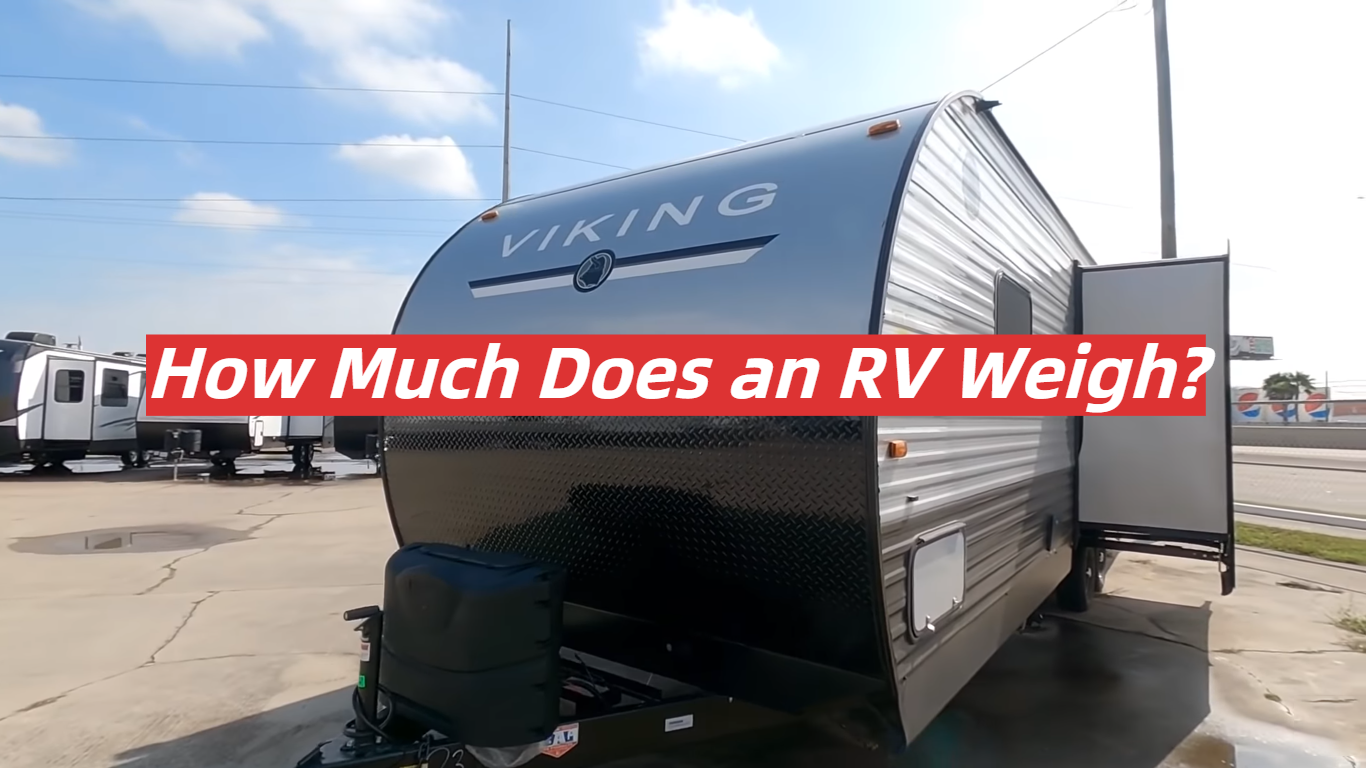




Leave a Reply